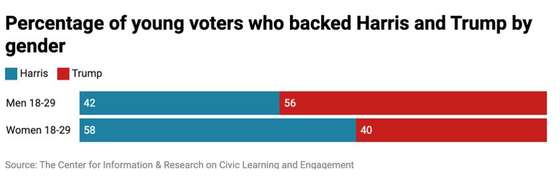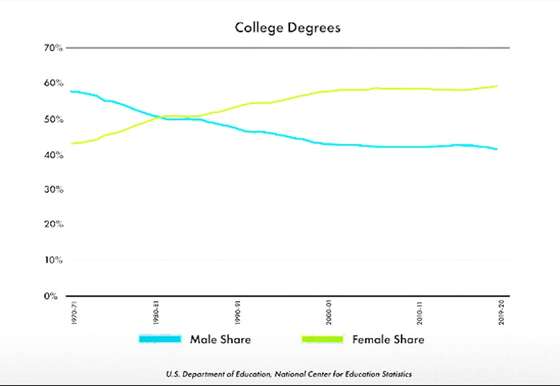Without the old jobs and salaries that allow them to support their families, it is not surprising that men are more concerned about the economy – and this fundamental aspect redesigns the way they integrate, or not.
1 “It’s the economy”
When trying to identify what Americans were most concerned about in the recent election, the data clearly pointed to the economy, although many experts found this aspect surprising: from their perspective, the economy “is great.” This is a kind of “great disconnect”, which an article from The New York Times describes it this way:
“By usual standards, the economy is strong. Inflation has slowed significantly. Salaries are increasing. Unemployment is near its lowest level in fifty years. Job satisfaction is growing. However, Americans don’t necessarily see things this way.”
This is, in fact, a disconnection very different from ours and is probably repeated in many European countries:
“People don’t behave the way they do when they think the economy is bad. “They are spending, taking vacations and changing jobs as they usually do when they think the economy is doing well.”
What many Americans say is that, despite being able to meet their essential commitments, at the end of the month they are left with a lot of “irritation and anxiety about prices, the pandemic and politics” and very little money. And economic hardship is greater for those without a college degree: They have lower wages, fewer benefits, and more physically demanding jobs, and these people make up the majority of the population.
Perhaps this would be enough to indicate the final decision of the electoral pendulum: after all, most polls pointed to Donald Trump as more competent in economic matters, and Kamala Harris chose to focus on other issues, without distancing herself from Biden. But the economic dimension has also served to analyze another electoral trend: men tend to worry more about the economy and this would reinforce the political divergence with respect to women, who have shown a pro-democratic inclination.
However, claiming that men tend to worry more about economic issues requires a more subtle interpretation. It refers to a reality that is little talked about, but that little by little has been revealed and that has to do with the impact that the new world of equality policies is having on men.
2 the lost boys
To delve deeper into this topic, we must begin with the work of Richard Reeves, founder of the American Institute for Boys and Men. After decades of studying issues of inequality, Reeves found troubling data about men and documented it in 2022 with the publication of Of boys and men: why the modern man is fighting, why it is important and what to do about it. The conclusion of his work is simple: boys (and men) are in trouble.
We can present Reeves’ argument considering three dimensions: education, economy and social integration, although they often intersect. Let’s start with teaching. Reeves generally presents his argument based on the following data: in 1972, when Title IX was approved, which sought to guarantee equal conditions for women in North American universities, the gap between men and women completing a university education was 16 percentage points. In 2023, this range became 18 percentage points, but the other way around:
For the author, it is surprising that this figure is not a cause for concern, since it reveals a set of difficulties that children have experienced at school: they fail more, obtain worse results, enter university less and drop out more. rate than girls. And a relevant part of the justification is biological: not only do children find it more difficult to adapt to the physical discipline that school demands (especially if we consider the increasing reduction in physical activities and breaks), but children mature more late. Let’s think, in particular, about the maturation of the prefrontal cortex: that fundamental part of the brain that allows us to make long-term decisions and repress immediate desire (such as gambling). games station) with an eye toward long-term goals (such as studying for tomorrow’s exam that will allow us to increase our chances of entering university). This occurs later in boys, leaving them at a disadvantage in school competition.
But there is another worrying aspect, which is already being felt among us. In the United States, practically one in four children in school is diagnosed with developmental or concentration problems: since it is more difficult for them to sit for so many hours and it is more challenging for them, the solution has been to medicate them. But Reeves asks: Are children failing in school? Or is it the school that is failing the children??
In economic terms, the scenario is equally challenging: most American men today earn less than most men did in the 1970s (adjusted for inflation, naturally), primarily as a result of the jobs they traditionally held. corresponded, and that they were well compensated (some even argue that they were excessively well compensated), having disappeared due to the processes of offshoring and automation. Without the old jobs and salaries that allow them to support a family, it is not surprising that men worry more about the economy – and this is a fundamental aspect that redesigns the way they integrate socially.
Studies compiled by Reeves reveal that men have fewer friends than previous generations and report feeling lonely regularly. They are four times more likely than women to commit suicide, three times more likely to be affected by drugs and alcohol, and are the main victims of “deaths of despair.” Many studies report the sensation of feeling obsolete (as a result of women’s labor emancipation) and the target of parental alienation.
Let us clarify, almost unnecessarily, this aspect: Reeves does not deny that equality between men and women is a political value; Just remember that this is not a zero-sum game: some don’t have to lose for others to win. And if the kids lose, the whole society loses. Therefore, we must be aware of the impact that our measures have and the counterproductive effects that we neglect. In the end,
“You cannot overthrow a 12,000-year-old social order without experiencing cultural side effects. In this case, it is about the displacement of many of our boys and men.”
3 The political divergence of men
In his work, Richard Reeves has presented some hypotheses to address this problem: boys should enter school a year later than girls; It is necessary to promote vocational training, which among us is viewed with considerable contempt, since it is especially advantageous for children (Jonathan Haidt, in The anxious generationdefends the same); and we must abandon the use of the expression “toxic masculinity” and all the ideological weight that it carries.
But, above all, his diagnosis is useful for analyzing current electoral trends: considering everything that has been said, would it be surprising if there were a political divergence of young men towards the Republican Party, as revealed by the analysis of the recent presidential elections? According to the the guardianThe distribution of votes between 18 and 29 years old was reflected as follows:

Studies carried out during the last year had already shown that, despite this pro-republican tendency, the majority of young people do not have a typically conservative profile and tend to coincide with a broad set of values that are understood as progressive – such as marriage. between people of the same sex, the legalization of abortion (within reasonable deadlines) and equality between men and women (I see this in my students constantly). But they feel that their concerns are not taken into account; on the contrary, They are demonized.
Journalist Claire Cain Miller has been researching the issue and, when interviewing young people who were planning to vote for Trump, noted that
“They feel devalued. They said it has become more difficult to be a man and valued strength in a president. However, they did not express bitter misogyny or praise the exaggerated shows of force adopted by the Trump campaign. “His concerns were primarily economic, such as the ability to fulfill the traditionally masculine role of supporting a family.”
However, we are on a knife edge, as Daniel A. Cox points out:
“Due to a growing sense of insecurity, more and more young men are adopting a zero-sum view of gender equality: if women win, men inevitably lose. “It is a perspective that puts them on the defensive and encourages them to ignore or dismiss the persistent challenges that women still face, and can even encourage misogyny.”
Back to Reeves: If the data shows us that young men are struggling and social structures don’t have answers for them, it’s not surprising that they are drawn to leaders or strong figures who don’t have the best answers. We will return to the topic next week.
Source: Observadora
